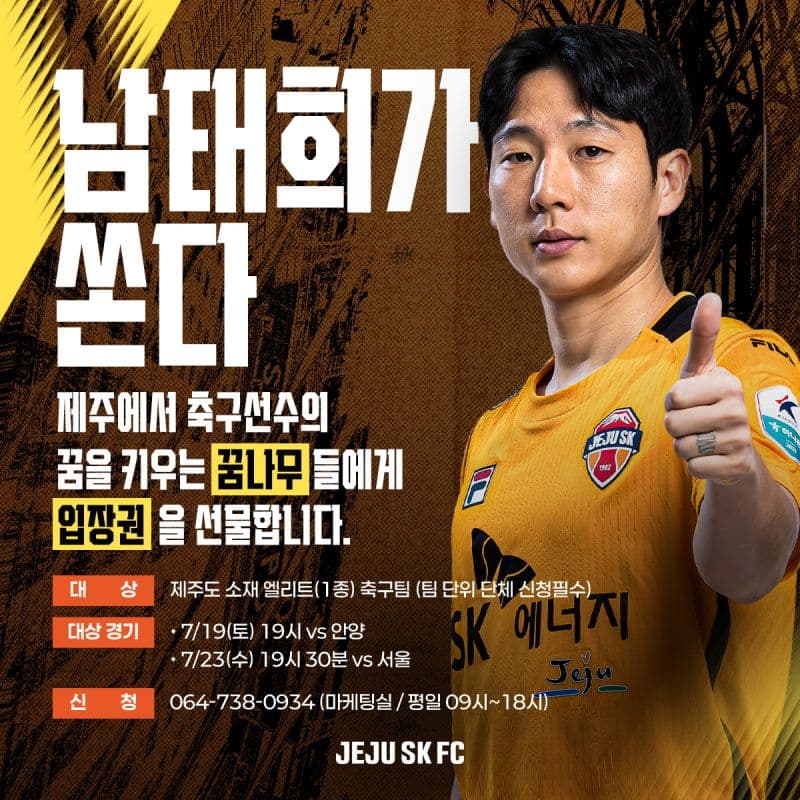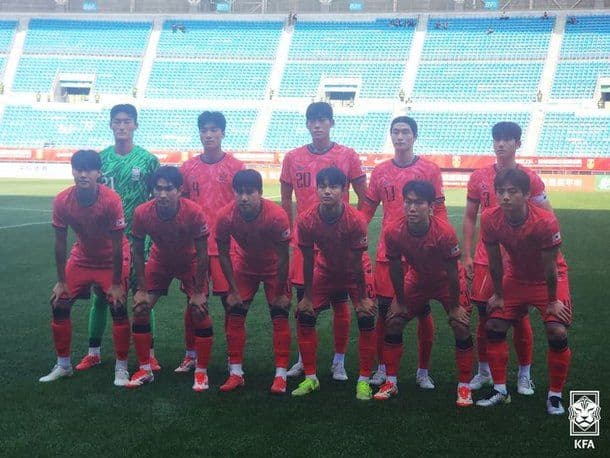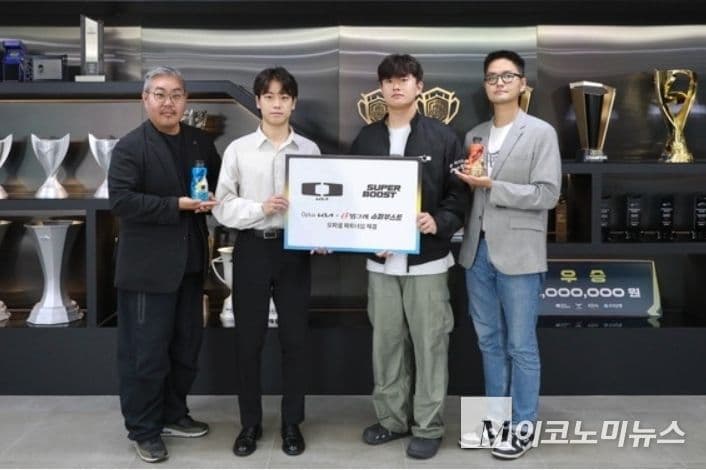The 'Orange Messi' Opens His Wallet for Young Dreamers: Nam Tae-hee's Heartwarming Gesture

The Heart of Jeju's Football Community
In the world of Korean football, few stories capture the essence of community spirit quite like Nam Tae-hee's latest gesture. The 34-year-old midfielder, affectionately known as the 'Orange Messi' by Jeju SK FC fans, has once again demonstrated why professional athletes can be powerful agents of positive change. His decision to personally fund stadium tickets for young football players participating in elite programs and the 33rd Baekrok Cup National High School Football Championship represents more than just generosity—it's a testament to the growing culture of giving within Korean football.
Nam Tae-hee's initiative comes at a particularly meaningful time, as summer heat intensifies across Jeju Island and young athletes face additional stress from training in challenging conditions. By inviting elementary, middle, and high school elite football teams to watch professional matches, he's providing these aspiring players with both respite and inspiration. The gesture reflects a deep understanding of what it means to nurture the next generation of Korean football talent, recognizing that exposure to professional-level play can be transformative for young minds.
A Growing Tradition of Player-Led Philanthropy

What makes Nam Tae-hee's actions even more remarkable is how they fit into a broader pattern of player-initiated charity work at Jeju SK FC. This isn't an isolated incident but part of an organic movement within the squad that has been building momentum over recent seasons. In 2023, Kim Seung-seop personally funded tickets for 1,700 elementary school students across Jeju Island, while Lim Chang-woo invited 1,500 high school seniors to experience professional football firsthand.
The tradition continued to evolve in 2024 when 'Baekrok Star' Koo Ja-cheol made headlines by inviting 455 participants from the Baekrok Cup tournament to attend matches at his own expense. This year, An Tae-hyeon has also contributed by providing snacks to fans visiting the stadium. Each gesture builds upon the previous ones, creating a culture where giving back isn't mandated by the club but emerges naturally from the players' genuine desire to connect with their community. This organic development speaks volumes about the character of the individuals wearing the Jeju SK jersey.
The 'Orange Messi' Phenomenon
Nam Tae-hee's nickname as the 'Orange Messi' isn't just a playful reference to his team colors—it represents the way he's captured the imagination of Jeju football fans since his professional debut in July of the previous year. Despite initial concerns about adapting to K League competition at age 33, Nam Tae-hee has proven that experience and passion can triumph over conventional wisdom about athletic prime years.
His impact extends far beyond statistics and match performances. The midfielder has become a symbol of what it means to embrace a new community wholeheartedly. His recent appearance at Ohyeon Middle School as part of the 'Visiting Football Classroom' program generated what the club described as 'Waterbomb-level cheers'—a reference to Korea's popular summer music festival known for its energetic atmosphere. The comparison perfectly captures the excitement Nam Tae-hee brings to every interaction with young fans, whether through recreation activities, autograph sessions, or photo opportunities.
Community Engagement Beyond the Pitch
The 'Visiting Football Classroom' program represents another dimension of how Jeju SK FC players engage with their community. This initiative sees professional players visiting local schools during regular class time or after-school hours to interact directly with students. Nam Tae-hee's participation as a mentor in this program at Ohyeon Middle School created such a positive response that it attracted attention from fellow players, including national team veteran Ji Dong-won of Suwon FC.
Ji Dong-won, who shares Jeju origins with Nam Tae-hee, left a comment calling the school 'No1. middle school in Jeju,' highlighting the camaraderie between players who understand the importance of grassroots development. These interactions demonstrate how professional football can serve as a bridge between generations, inspiring young people while keeping seasoned players connected to their roots. The authentic enthusiasm shown by students during these visits provides immediate feedback on the program's value, creating a cycle of positive engagement that benefits everyone involved.
The Broader Impact on Korean Football Culture
Nam Tae-hee's charitable initiatives reflect broader changes occurring within Korean football culture, where individual players are increasingly taking personal responsibility for community development. This shift represents an evolution from traditional corporate-sponsored charity events to more personal, player-driven initiatives that create direct connections between professional athletes and their local communities.
The timing of Nam Tae-hee's gesture is particularly significant, coinciding with Jeju SK FC's home matches against Anyang FC on July 19th and Seoul FC on July 23rd. By specifically targeting these high-profile K League 1 fixtures, he's ensuring that young players will witness top-level competition while experiencing the electric atmosphere that only live professional football can provide. This exposure can be crucial for young athletes' development, offering them role models and demonstrating the level of skill and dedication required to succeed at the highest levels of Korean football.
Fan Reactions and Community Response
Online communities have responded enthusiastically to Nam Tae-hee's latest charitable initiative, with fans across various platforms expressing admiration for his continued commitment to youth development. On Naver Sports and DC Inside football communities, comments have been overwhelmingly positive, with users praising both his individual generosity and the broader culture of giving that Jeju SK FC has cultivated.
Many fans have noted how Nam Tae-hee's actions contrast with the sometimes cynical view of modern professional sports, where commercial interests often overshadow community connection. His willingness to use personal funds rather than relying on corporate sponsorship has particularly resonated with supporters who value authentic gestures over publicity-driven charity events. The fact that multiple Jeju SK players have independently chosen to support local youth programs suggests a genuine team culture that prioritizes community engagement alongside on-field success.
Looking Toward the Future
As Nam Tae-hee stated in his recent interview, his primary motivation stems from gratitude for the warm welcome he received from Jeju Island residents during his transition to professional football. His philosophy that 'Jeju's future must smile for Jeju Island to smile bigger' encapsulates a mature understanding of how sports figures can contribute to regional development and community pride.
This approach to player engagement could serve as a model for other K League clubs seeking to deepen their community connections. By encouraging individual players to take initiative in supporting local causes, teams can create more authentic relationships with their fan bases while contributing to positive social change. Nam Tae-hee's example demonstrates that meaningful community engagement doesn't require massive budgets or elaborate programs—sometimes the most powerful gestures are the simplest ones, driven by genuine care and personal investment in others' success.
Discover More

Japan's Bold Olympic Strategy: Why They're Already Building Their 2028 LA Team with 17-Year-Old Prodigies
Japan is making strategic moves for the 2028 LA Olympics by calling up three 2007-born players to their U-22 squad for the Uzbekistan tour, showcasing their long-term planning approach.

Binggrae SuperBoost Partners with Dplus KIA: A Game-Changing Move in Korean Esports
Binggrae's energy drink brand SuperBoost has officially partnered with premier esports team Dplus KIA, marking a significant expansion into the competitive gaming market targeting MZ generation consumers.